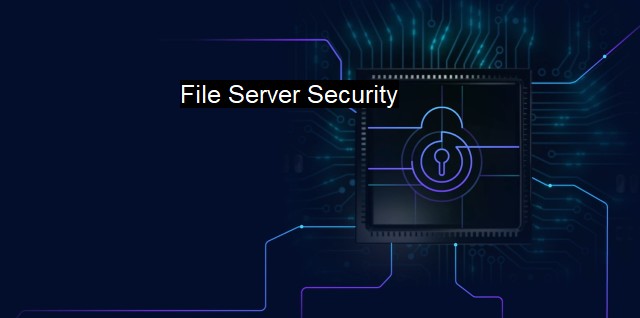What is File Server Security?
The Importance of File Server Security: Safeguarding Critical Business Data from Cyber Threats and Attacks
File Server Security refers to the policies, procedures, and technology used to protect files and data on network servers from unauthorized access, alteration, or destruction. In the realm of cybersecurity and antivirus protection, it is considered a fundamental element. In broader terms, a file server is a robust computer in charge of storing, managing, and sharing files and data over a network to multiple users or client computers.When discussing the context of file server security, the focus lies on ensuring that files while hosted, shared, or used do not fall into wrong hands — intending to alter, steal, or delete the files resulting in data breaches. These measures must also work to mitigate potentially serious threats such as viruses, spyware, and Trojan horses, which can spread across a network and cause extensive damage.
Cybersecurity strategies employ various tactical and strategic layers to safeguard the file servers against potential threats. User authentication is the primary line of defense, ensuring that only persons with legitimate access can interact with the server resources. This can be handled through passwords, sperate user accounts, biometric verification, or two-factor authentication.
Adopting the principles of least privilege and need-to-know can further reduce the chances of unauthorized access or damage. Individuals should only have access to the server resources that they need to carry out their job responsibilities, and no more. Intrusion prevention and detection systems are also common, identifying patterns of inappropriate or suspicious activity and automatically employing preventative measures or raising an alarm.
One component of file server security deals specifically with viruses and malware. Antivirus applications are employed to prevent, detect, and remove these threats. Regularly updated virus definitions ensure that the software can identify and block the latest viruses, while routine scans help to discover any threats or vulnerabilities.
Firewalls also offer pharmaceutical protection for file servers. They either permit or deny traffic over a network based on prescribed rules and protocols. This ensures only legal commands or pieces of data from verified sources can reach the server.
Beyond securing the file server itself, measures must also be taken to safeguard the files housed within it. This includes technologies like encryption, where the data within a file is transformed into an unreadable format that can only be deciphered with the correct decryption key. This ensures that even if the file server is breached, the data within founded files remains inaccessible to unauthorized users.
The security of a file server also heavily relies on consistent backup and recovery strategies. In case of the worst-case scenario – an effective cyber-attack leading to the significant data loss – backup copies of the files serve as a recovery point, allowing organizations to minimize damages and restore operations. Using a combination of on-site and off-site backups adds an extra layer of security.
Regular server updates and hardware maintenance contribute to preventing vulnerabilities that could be exploited by cybercriminals. Operating systems (OS) and programs require consistent updates for seamless operation and protection against newly found threats.
File server security is necessary to keep sensitive data safe and mitigate potential threats, which in consequence would help to boost overall organizational productivity and sustainability without the fear of losing crucial data. In a multidimensional sense, file server security encapsulates protecting the hardware, software, data in transit, and data at rest — indeed a stalwart of the cybersecurity domain.
File server security involves an intricate interplay of user accountability, firm cybersecurity measures, potent antivirus solutions, consistent server maintenance, rigid backup systems, prompt threat intelligence, and response mechanisms. Organizations and cybersecurity professionals pay diligent attention to this aspect, significantly reducing the probability of data breaches, ensuring business continuity, and maintaining consumer trust.

File Server Security FAQs
What is file server security and why is it important?
File server security refers to the protection of files and data stored on a server from unauthorized access, theft, or corruption. It is important because servers often contain sensitive or confidential information, and a breach can have serious consequences such as data loss, financial impact, or damage to reputation.What are some common security risks associated with file servers?
Some common security risks include malware infections, unauthorized access or use, weak passwords, unpatched software vulnerabilities, physical theft or damage, and insider threats.How can antivirus software help improve file server security?
Antivirus software can help detect and remove malware, viruses, and other malicious programs that can compromise file server security. It can also provide real-time protection against new threats and can be configured to scan files and folders regularly. Regular updates to the antivirus software can ensure that it remains effective against the latest threats.What are some best practices for securing a file server?
Some best practices include implementing access controls and user authentication, using strong passwords and limiting user privileges, regularly backing up important data, encrypting sensitive data, installing and updating antivirus and other security software, monitoring server activity and logs, and conducting regular security audits and assessments. It is also important to educate users about good security habits such as avoiding opening suspicious emails or clicking on unknown links.| | A | | | B | | | C | | | D | | | E | | | F | | | G | | | H | | | I | | | J | | | K | | | L | | | M | |
| | N | | | O | | | P | | | Q | | | R | | | S | | | T | | | U | | | V | | | W | | | X | | | Y | | | Z | |
| | 1 | | | 2 | | | 3 | | | 4 | | | 7 | | | 8 | | |||||||